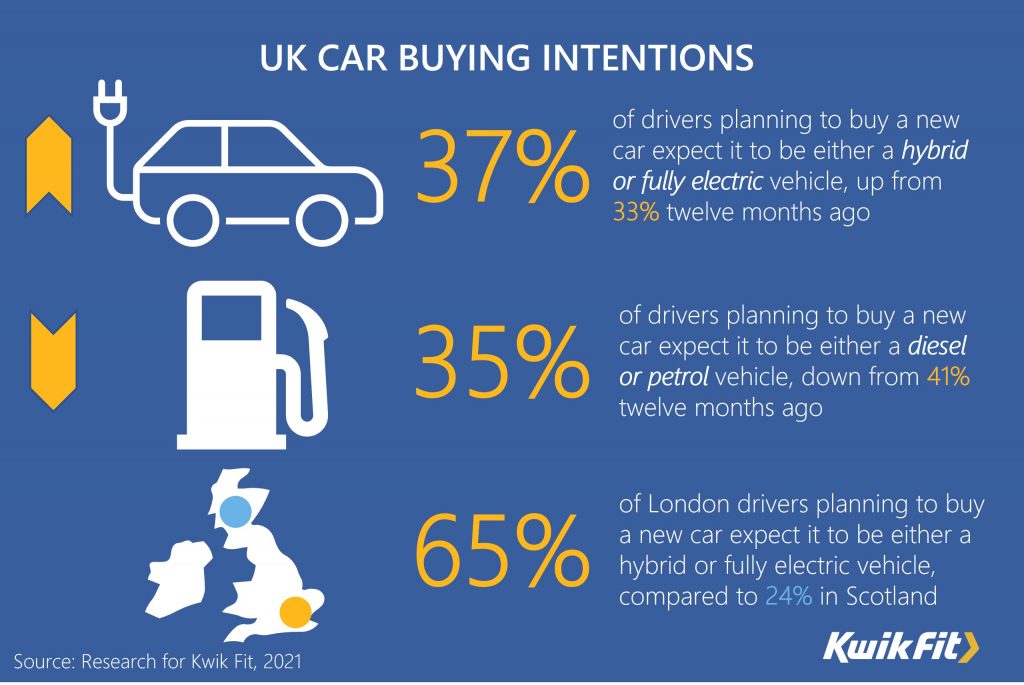New research released today reveals that the number of drivers expecting to be going to a fully electric car has risen by 32% in twelve months.
A study for Kwik Fit, the UK’s leading automotive and servicing and repair company, reveals that 11% of drivers who are planning to change their car expect its replacement to be fully electric. This compares to 8% of drivers a year ago. When including hybrid vehicles, the number of drivers anticipating opting for a low emission model for their next vehicle rises to 37%, a rise from 33% over the last 12 months.
In the last year, hybrid or fully electric cars have overtaken petrol and diesel models as most drivers’ expected next vehicle. Twelve months ago, Kwik Fit’s research showed that the 33% of drivers who expected their next car to be a low emission vehicle were outweighed by the 41% who said their next car would have a petrol or diesel engine. This balance has been reversed, with the 37% now stating that their next vehicle would be low emissions outstripping the 35% likely to opt for a diesel or petrol model. (28% of drivers said they didn’t know, compared to 26% a year ago.)
Of all the UK regions, drivers in London are the most likely to be considering switching to either a hybrid or fully electric, with 65% of drivers saying they are doing so. The second highest region is the North East, with 49%, while the lowest is Scotland, where only 24% say they are opting for a low emission motor in their next car.

The research indicates there is a challenge for policy makers looking to encourage drivers to switch to electric as soon as possible. Kwik Fit’s research found that on average, drivers expect to change their vehicle in 21.6 months. Those expecting their next car to be electric plan to change their car in an average of 23.9 months, compared to 17.6 months for those opting for internal combustion models.
Although low emission vehicles as a whole have overtaken diesel and petrol models as planned purchases, only one in nine drivers (11%) planning to buy another vehicle are considering fully electric cars. Kwik Fit’s research examined the factors which are putting drivers off going full electric.
While the greatest deterrent varies in some regions, overall the lack of fast charging points is the biggest factor, cited by 38% of drivers not yet considering swapping to fully electric. This rises to 51% among Welsh drivers and 50% in Yorkshire. In the North East, South West, South East and Scotland, the increased cost over an equivalent petrol or diesel model is the greatest barrier. For drivers in the West Midlands and the East of England, their biggest concern is the perceived restrictions on range of electric cars.
| Reason | % of car owners not considering buying an electric car |
| The lack of fast charging points in the areas I commonly drive | 38 |
| The increased cost over an equivalent sized petrol, diesel or hybrid car | 36 |
| The restrictions on range/inability to travel long distance on a single charge | 35 |
| I would not be able to charge it at home | 33 |
| I am worried that the batteries won’t last very long and need replacing | 26 |
| I prefer traditional petrol or diesel engines | 16 |
| I want to know more people who have one before I commit | 16 |
| I don’t believe that they are more environmentally friendly than existing cars | 12 |
| I don’t like the style of electric cars available | 8 |
| There isn’t an electric car which provides the power I need | 8 |
Source: Kwik Fit, 2021
Kwik Fit has been investing in its electric vehicle capabilities alongside the growth in the EV car parc and now has over 570 technicians qualified to work on EVs, the largest EV qualified workforce in the automotive servicing sector. Although the pandemic caused some interruption to the company’s training programme, it is now back running at full capacity with the capability for around 40 technicians a month to become qualified on EVs.
Roger Griggs, communications director at Kwik Fit says: “This research shows that over the last twelve months car buyers appear to have passed a tipping point in the switch to electric cars. However, although consideration of low emission models has overtaken that for petrol and diesel there is clearly still a lot to do to convince some drivers. Some barriers to consideration can be put down to misperception or a lack of up to date knowledge and the industry must work together to address those areas. But it is also vital that there is visible investment made in the charging infrastructure to ensure that drivers have the confidence to make the switch.
“At Kwik Fit we have been heavily investing in our EV capability to provide drivers with the reassurance that they will be able to get their car repaired across our network, whatever type of fuel it uses.”
Whilst fear of lack of charing points remains, the range of most EV’s now are extending to that of a petrol engine or not far from it. With a huge drive from manufactures and individuals, the network for charging is growing at a pace which will elevate that fear.
In order to find the services offered at their nearest Kwik Fit centre drivers can contact the centre directly. Details of their nearest centres are available at kwik-fit.com